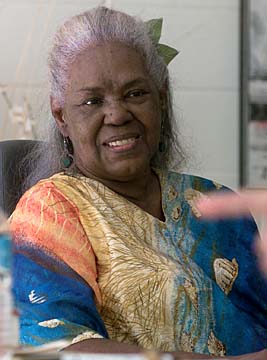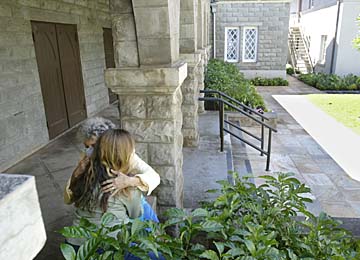|

|
Poverty strikes
in ‘golden years’
Years out of the work force
leave isle women especially
vulnerable in later years
» Tonight on KITV
|
|
Now, at 68, Protho has grown accustomed to scraping by, doing without and worrying about how she'll make it to the next check, the next month. Her meager annual income -- her only income -- of $7,600 is $4,000 below the federal poverty line.
"I know how to stretch food," Protho said, as she leaned back in her chair and turned her lips up into a polite smile, trying to ward off pity. "With great difficulty, I make it. I do the best I can."
Protho, who started working at 15 and has owned two businesses, worked for big-name Honolulu law firms and spearheaded a campaign in the 1950s to get more African-American models into ads, doesn't fit the stereotype -- for whatever it's worth -- of a woman in poverty. But among elderly women in poverty, few generalities can be made.
Some 17,500 women over 60 in Hawaii live below, at, or just a hair above the poverty line.
They are housewives and retired professionals, former clerks and teachers. Some were always poor, others fell into economic straits after retirement.
If they share anything, says Pat Sasaki, executive director of the state's Office on Aging, it is their failure to have saved for retirement over their working lives -- either because they couldn't afford to or didn't know they should. "As women often do live longer than men, it becomes essential that they've planned," Sasaki said. "This is a real hard concept to sell."
The issue is expected to become increasingly prominent in coming years, as baby boomers retire and require more services. Between 1990 and 2000, the population of older adults in Hawaii jumped by 19 percent -- more than twice the national average.
In five years, 21 percent of Hawaii's population will be over 60, compared with 12 percent in 1980, according to the state's "Profile of Hawaii's Older Adults."
And more than half of those will be women -- if current gender breakdowns persist -- who are more likely than their male counterparts, locally and nationally, to struggle financially, unable to afford rising food, medicine, housing and other living costs.
"The population that is now in their 20s and 30s is going to be dealing with a much older society and one of the key issues for women is income to support them in longevity, their ability to pay living expenses," Sasaki said. "It's a real challenge. There are not easy answers to this."
IT'S A WARM DAY in Wahiawa, but a breeze keeps things bearable. Protho keeps her door open wide for air, leaves the lights out and pours herself a cold Pepsi.
She's lived in a public housing apartment on California Avenue since 1999, after she was unable to pay soaring rents in town.

|
Initially, the move threw her into depression. Here she was, Protho thought, retired and unable to pay for housing without help from the government.
No savings, no job. Next stop, nursing home.
Today, Protho is upbeat, jovial and involved -- producer of an Olelo show on the elderly, director-at-large of Laiola Seniors Residents' Association and vice president of "Tenants on the Rise," a nonprofit aimed at helping public housing residents.
As she sits in front of her donated computer, which she uses to write and design a newspaper for the group, Protho looks confident and content. She fingers a cigarette, but doesn't light it. Ten medicine bottles sit on the table, where she rests her elbows.
"I have no regrets and no complaints," she says, sitting up straight. "I have always been frugal. Now, I do without."
Protho moved to Hawaii in 1979 after working as an administrative assistant at several mainland universities. She came to the islands to vacation with a friend and ended up staying, landing a job as a secretary at the University of Hawaii for several years.
In the 1980s and 90s, she went into business on her own twice, handling secretarial services for law firms, entrepreneurs and unions.
When Protho was working full-time, as early as her 30s, she tried to put away a little from each paycheck and curtailed frivolous spending.
But her savings disappeared long before retirement. She was forced to dip into it when times got tight between jobs or when family members were in trouble.
And that's not unusual among women who try to save for retirement, said Diane Terada, administrator of Catholic Charities Hawaii's elderly services program, which helps elderly clients manage money, find affordable housing or apply for assistance programs.
About 80 percent of their clients are women.

|
"We deal with a lot of elderly women because there are lot of financial issues," Terada said. "Obviously, many of them either have not worked or have not worked throughout their entire adulthood or have been working at jobs that didn't make as much money."
Denise Santiago's health stopped her from ever getting a job, though she volunteered whenever she could muster the strength.
The slight woman with wiry, misshapen hair and a gray, gaunt face, was born with severe allergies, asthma and Wolff-Parkinson-White Syndrome, which brings on a rapid heartbeat that can throw sufferers into cardiac arrest.
More recently, the 66-year-old from Makiki developed lumbar disc disease, causing excruciating back pain.
Santiago's parents were able to set aside a small savings for her, which she lived off of until about two years ago. Then, she was forced to turn to government assistance and charities.
Her Social Security and disability checks, which amount to about $699 a month, only barely cover her rent. The rest usually goes to medical supplies -- special masks, filters for air purifiers and other devices -- leaving little, if anything, for food and other necessities.
She says she's eaten crackers or sliced white bread alone for days to be able to pay for medications, which help keep her alive.
"In spite of my disabilities, I keep on going," Santiago said, her voice jerkily rising and dipping -- as if she's gasping for breath but can't bear to gulp at any more air.
As she speaks, sitting on a bench outside Kuakini Hospital in Liliha, where she gets treatment, she rests one hand over her heart and holds three allergy masks to her mouth with the other.
|
When he retired, she was in her early 20s. One day, he came to her home with a bewildered, collapsed look on his face. "He said, 'I can't believe that I didn't plan for my retirement.' He had nothing," Sargent-Hamill said. "He was just mortified."
Sargent-Hamill bought her first stock at 28 and started saving by 35. She's now set for retirement, just a few years down the road. She's also in the minority.
A recent national poll conducted by the Women's Institute for a Secure Retirement found that 38 percent of women 30 to 55 years old fear they'll live at or near the poverty line when they retire. Meanwhile, 54 percent say they cannot save for retirement once they pay their bills.
U.S. Census estimates released this year show that 8.6 percent of Hawaii's elderly (those 60 or older) live at or below the poverty line, taking in less than $9,060 annually. Twenty-six states have higher poverty rates, but the statistics don't take into account Hawaii's higher cost of living.
"The best advice that I can give is you really need to start planning for your retirement when you're about 35," Sargent-Hamill said. "Social Security is on shaky ground, even pensions."
Barbara Kim Stanton, state director for the American Association of Retired Persons, said women have reason to fear retirement. The median income for women 65 and older in Hawaii is $11,816 -- about half of what men take in, she said.
Stanton predicts the state will be "overwhelmed" when baby boomers start retiring en masse over the next two decades.
Women looking at retirement either 10 or 30 years from now need to take it on themselves to start saving.
"Women need to put themselves first," she said. "Very often, they're spending on other people. But they should put money aside as if retirement was a debt as important as a utility bill."
Tonight on KITV 4 News at 10 ...
E-mail to City Desk
[News] [Business] [Features] [Sports] [Editorial] [Do It Electric!]
[Classified Ads] [Search] [Subscribe] [Info] [Letter to Editor]
[Feedback]


